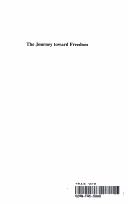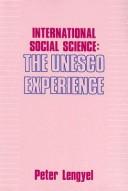| Listing 1 - 10 of 42 | << page >> |
Sort by
|

ISBN: 0838631150 Year: 1982 Publisher: Rutherford Fairleigh Dickinson university press
Abstract | Keywords | Export | Availability | Bookmark
 Loading...
Loading...Choose an application
- Reference Manager
- EndNote
- RefWorks (Direct export to RefWorks)
Book
ISBN: 9783030979430 Year: 2022 Publisher: Cham Springer International Publishing :Imprint: Springer
Abstract | Keywords | Export | Availability | Bookmark
 Loading...
Loading...Choose an application
- Reference Manager
- EndNote
- RefWorks (Direct export to RefWorks)
Book
ISBN: 9788485436620 8485436628 Year: 1989 Publisher: Madrid: Iepala,
Abstract | Keywords | Export | Availability | Bookmark
 Loading...
Loading...Choose an application
- Reference Manager
- EndNote
- RefWorks (Direct export to RefWorks)

ISBN: 0878554777 Year: 1983 Publisher: New Brunswick (N.J.) : Transaction books,
Abstract | Keywords | Export | Availability | Bookmark
 Loading...
Loading...Choose an application
- Reference Manager
- EndNote
- RefWorks (Direct export to RefWorks)
Economic development --- Religion and economics. --- Religious aspects.

ISBN: 0415237068 041523705X 0203244478 1280107731 113456032X 0203469283 9780203244470 9780203469286 9780415237062 9781134560325 9781134560271 9781134560318 9780415237055 1134560311 Year: 2000 Publisher: London New York Routledge
Abstract | Keywords | Export | Availability | Bookmark
 Loading...
Loading...Choose an application
- Reference Manager
- EndNote
- RefWorks (Direct export to RefWorks)
Exhausting Modernity is a bold new work on the exhaustion of our resources, both natural and human. Drawing on the insights of Marx and Freud, it provides a compelling analysis of the exhaustion pervading modern capitalism: environmental collapse, rising poverty levels and increasing global economic disparity. This is essential reading for political and social theorists, philosophers, economists, and all those interested in the environment.
Economics --- Philosophy. --- Religious aspects. --- Religion and economics --- Philosophy --- Religious aspects
Book
ISBN: 1843318326 9786613377296 0857289527 1283377292 9780857289520 9781283377294 9781843318323 6613377295 Year: 2010 Publisher: London Anthem Press
Abstract | Keywords | Export | Availability | Bookmark
 Loading...
Loading...Choose an application
- Reference Manager
- EndNote
- RefWorks (Direct export to RefWorks)
'The Hidden Form of Capital' presents evidence from several parts of the changing world about how the realm of the spirit affects the economy.
Economics -- Religious aspects. --- Economics. --- Economics --- Business & Economics --- Economic Theory --- Religious aspects --- Religious aspects. --- Religion and economics
Book
ISBN: 1316952061 1316952959 131695384X 1316957403 1316954730 1316636968 1316888703 1107186056 1316956512 131694672X 9781316888704 9781316957400 9781107186057 9781316636961 Year: 2017 Publisher: Cambridge, United Kingdom New York, NY
Abstract | Keywords | Export | Availability | Bookmark
 Loading...
Loading...Choose an application
- Reference Manager
- EndNote
- RefWorks (Direct export to RefWorks)
Since the collapse of the Berlin Wall, there has been a widespread affirmation of economic ideologies that conceive the market as an autonomous sphere of human practice, holding that market principles should be applied to human action at large. In the wake of the 2008 financial crisis, the ascendance of market reason has been countered by calls for reforms of financial markets and for the consideration of moral values in economic practice. This book intervenes in these debates by showing how neoliberal market practices engender new forms of religiosity, and how religiosity shapes economic actions. It reveals how religious movements and organizations have reacted to the increasing prominence of market reason in unpredictable, and sometimes counterintuitive, ways. Using a range of examples from different countries and religious traditions, the book illustrates the myriad ways in which religious and market moralities are closely imbricated in diverse global contexts.
Economics --- Economic theory --- Political economy --- Social sciences --- Economic man --- Religion and economics --- Religious aspects. --- Moral and ethical aspects.
Book
ISBN: 9783110782301 3110782308 3110782480 3110782685 Year: 2023 Publisher: Berlin De Gruyter
Abstract | Keywords | Export | Availability | Bookmark
 Loading...
Loading...Choose an application
- Reference Manager
- EndNote
- RefWorks (Direct export to RefWorks)
"The present volume of Key Concepts in Interreligious Discourses offers a fascinating insight into the history, the main ideas and current developments in economic thought from the perspective of the three major monotheistic faiths Judaism, Christianity and Islam. The reader encounters topics such as price control in rabbinic Judaism, Christian monks elaborating the foundations of modern accounting, and the latest innovations in Islamic banking. Each article has been written by a renowned expert on the subject and offers a historical overview over the development of the concept, the theological and philosophical principles in the Holy Scriptures of each faith, an outline of the practical application of the concept in the present, its significance for the future, and many more." --
Interreligious dialogue. --- finances. --- justice. --- work. --- Abrahamic religions. --- Economics --- Religious aspects. --- Religion and economics --- Religions --- Abrahamic religions --- Religious aspects
Book
ISBN: 1787149668 1787145360 1787145352 9781787145351 9781787149663 9781787145368 9781787145368 Year: 2017 Publisher: Bingley, UK
Abstract | Keywords | Export | Availability | Bookmark
 Loading...
Loading...Choose an application
- Reference Manager
- EndNote
- RefWorks (Direct export to RefWorks)
This book proves that each religious dogma, in any of their components, contain in an encoded manner a specific ranking of human comprehensive mega-objectives, implicitly, a specific preference for absolute wealth or, in a more common parlance, for the objective of economic performance. In turn, that specific preference, under ceteris paribus condition, determines the share of believer's general resources which is channeled to economic performance. An in-depth or correct understanding of a religious dogma, which makes sense for terrestrial social realities, is impossible without a specific model of decoding. Additionally, such a model is simply impossible within an orthodox Western, that is, non-transcultural perspective. There is no accident that all Western efforts to decode religions, economic or non-economic, have failed. Understanding religion based on its face story is very precarious, if not even dangerous.
Religions --- Comparative religion --- Denominations, Religious --- Religion, Comparative --- Religions, Comparative --- Religious denominations --- World religions --- Civilization --- Gods --- Religion --- Economic aspects. --- Religion, Institutions & Organizations. --- Economic growth. --- Religion and economics
Book
ISBN: 9781138288850 1138288853 9781315267623 1315267624 9781351973625 1351973622 9781351973618 1351973614 9781351973601 1351973606 9781032237534 Year: 2020 Publisher: Abingdon Routledge
Abstract | Keywords | Export | Availability | Bookmark
 Loading...
Loading...Choose an application
- Reference Manager
- EndNote
- RefWorks (Direct export to RefWorks)
This Handbook introduces and systematically explores the thesis that the economy, economic practices and economic thought are of a profoundly theological nature. Containing more than 40 chapters, this Handbook provides a state-of-the-art reference work that offers students, researchers and policymakers an introduction to current scholarship, significant debates and emerging research themes in the study of the theological significance of economic concepts and the religious underpinnings of economic practices in a world that is increasingly dominated by financiers, managers, forecasters, market-makers and entrepreneurs. This Handbook brings together scholars from different parts of the world, representing various disciplines and intellectual traditions. It covers the development of economic thought and practices from antiquity to neoliberalism, and it provides insight into the economic-theological teachings of major religious movements. The list of contributors combines well-established scholars and younger academic talents. The chapters in this Handbook cover a wide array of conceptual, historical, theoretical and methodological issues and perspectives, such as the economic meaning of theological concepts (e.g. providence and faith); the theological underpinnings of economic concepts (e.g. credit and property); the religious significance of socio-economic practices in various organizational fields (e.g. accounting and work); and finally the genealogy of the theological-economic interface in Judaism, Christianity, Islam and in the discipline of economics itself (e.g. Marx, Keynes and Hayek). The RoutledgeHandbook of Economic Theology is organized in four parts: " Theological concepts and their economic meaning " Economic concepts and their theological anchoring " Society, management and organization " Genealogy of economic theology
| Listing 1 - 10 of 42 | << page >> |
Sort by
|

 Search
Search Feedback
Feedback About UniCat
About UniCat  Help
Help News
News